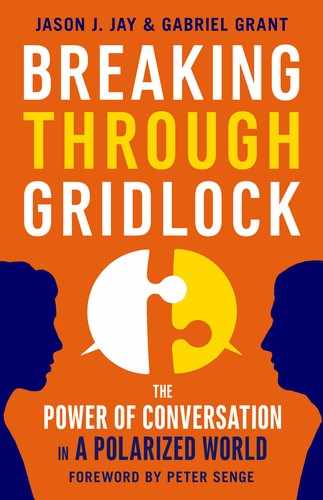Foreword
Some might say that the time for talking is over—that we have moved to such a polarized state that nothing much can be accomplished by conversation. It is now a win-lose world and we just need to be sure that our side, whichever that may be, wins. This is tantamount to saying that we are at war and it is down to battle tactics.
But whom are we at war with? The deep challenges in our world—climate change, destruction of species, profound inequity, underemployed and restless young people around the world, social instability, economies that produce a surplus of wealth and a deficit of meaningful work—were not produced by “the other.” They were produced by ourselves. We have a way of living that simply fails to generate basic conditions for well-being for ourselves and for many other living systems with whom we share a small planet. In this war with ourselves, winners and losers have little meaning, and we are left chasing our proverbial tails. We unwittingly substitute frenzy, anger, and fear for any sort of genuine progress that benefits all.
My conviction is that a growing number of people understand this. They know the world must change. They know you cannot keep growing materially on a finite planet and that the mindless pursuit of material growth for its own sake today mostly drives increasingly unhealthy competition for “my share” of the material pie, whether among people or countries. They know, at some level, that it is not about “us versus them.” It is about a new “we” in the sense of “What sort of future do all of us want to create?” Ironically, this understanding can make matters worse by widening the gap between what we see as needed and what we see as happening all around us.
Facing this reality, we all have basically the same choice: keep “fighting the good fight”—pursuing our favored definition of progress in a battle for control—or change. But what does this sort of change mean, and why is it not the same as “giving up”? First, it is not about working less in support of what you believe in. It is about working differently. Simply put, it is about realizing that there are outer obstacles and inner obstacles to real change. And, to effectively engage the outer obstacles without engaging the inner ones offers only an illusion of progress, just as does facing only the inner ones. The essence of the choice is doing both or doing neither. The real work is that of the reflective practitioner, cultivating effective action and enhanced awareness, addressing the problems “out there” while simultaneously discovering the impediments “in here.”
So, in the end, as activists working to shape a better world for our children and theirs—as we are doing every day in every exchange when we are purposeful about our lives—it comes down to how we will approach the next conversation. Just as the great physicist Werner Heisenberg said, “Science is rooted in conversations,” so is the same true regarding social change. Is our intent to win or to learn? Do we leave the conversation more connected with one another and more inspired about what is possible, or less so? Do we operate in service of a future that might emerge or of a past that binds us to habitual ways of thinking and acting?
Facing these transcendent questions, Jason Jay and Gabriel Grant offer a wonderful blend of guidance and practical help. They know that deep change is never only a matter of intention. It also always comes down to practice—having ways to approach day-to-day matters that continually open up our own awareness. They also know that this is never a solo journey but one that must be traveled with partners, people working together to continually discover what it takes to open head and heart in confronting today’s profound change challenges.
As neuroscientists say, “Under stress, the brain downshifts” and we revert to our most primitive and habitual patterns of behavior. This is no less true collectively. We can all see this downshift unfolding around the world today. If there is to be any real progress in addressing the profound issues we face, rehabilitating our capacities to listen to one another and genuinely talk and think together will be crucial.
Peter M. Senge
MIT Sloan School of Management
December 26, 2016
